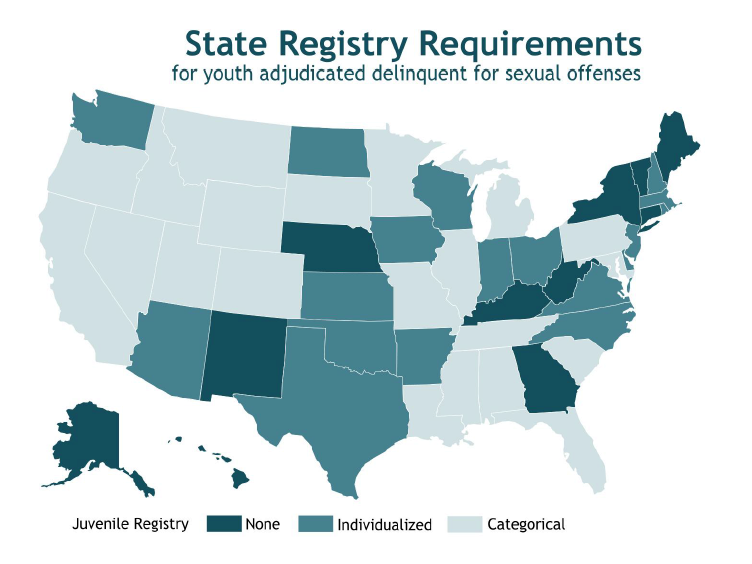
From a new report released by the Illinois Juvenile Justice Commission on sex offenders.
From The Chicago Bureau:
CHICAGO - The Illinois Juvenile Justice Commission released their report on juvenile sex offenders and registration practices Tuesday, with a leading author calling the current rules and regulations to protect children “patchwork,” and “complicated and confusing.”
“Even professionals don’t always understand what’s required under Illinois law,” said Lisa Jacobs, the vice chair of the commission and the program manager for the Models for Change juvenile justice initiative in Illinois.
The 150-page report, spearheaded by the chair of the IJJC, George W. Timberlake (a regular contributor to the JJIE), details the commission’s eight major findings and makes three main recommendations to the Illinois General Assembly and Governor Pat Quinn.
Illinois is “not in the mainstream” with its juvenile sex offender registration practices, Timberlake said. It is one of 20 states that places juvenile sex offenders on the sex offender registry, and there is very little flexibility when it comes to determining who must register.

- From a new report released by the Illinois Juvenile Justice Commission on sex offenders.
“There is no persuasive evidence that subjecting youth to registries improves public safety,” Timberlake said.
Illinois uses four broad categories to describe youth sexual offenses, three of which require juveniles to register as sex offenders for life. Only one charge (criminal sexual abuse, which usually refers to touching or fondling) garners a registration of 10 years. This strategy is “counter-productive,” the commission found, and these offense-based registration strategies “do not show positive results.”
It would be more effective to establish evidence-informed practices, “like risk-based, family-focused intervention, treatment and supervision” in order to reduce offense rates and minimize trauma for victims and their families.
The report notes that sending youth who commit sexual offenses to the Illinois Department of Juvenile Justice should be a “last resort.”
“Illinois should identify which tools are acceptable, use them to evaluate youth, and thereafter create individualized case plans,” Timberlake said.
The commission found the number of youth arrested for sex offenses in Illinois is small and has declined over the past few years, and half of the youth arrested are 14 years old or younger.
The number of youth arrested for sex offenses made up less than one percent of all juvenile arrests during the four sample years of the study (2004, 2006, 2008 and 2010).
 Most youth found guilty of sexual offenses face longer incarceration stays than their peers, the report states. In general, juveniles have incarceration stays of approximately six to seven months, while youth convicted of sexual offenses stay for approximately 19 months.
Most youth found guilty of sexual offenses face longer incarceration stays than their peers, the report states. In general, juveniles have incarceration stays of approximately six to seven months, while youth convicted of sexual offenses stay for approximately 19 months.
They also observed that most youth who commit sexual offenses are not repeat offenses — the recidivism rate for juvenile sex offenders is approximately 7.1 percent.
The state could save between $60,000 to $100,000 per youth per year if it switched to community-based treatment programs for juvenile sex offenders.
Multisystemic Therapy, a “family and home-based treatment” that utilizes cognitive-behavioral therapy, would be a more effective approach for treating troubled youth, the commission wrote in the report.
This form of therapy would “reduce risk at a cost significantly less than incarceration,” the report notes, but it is not widely offered throughout the state.
“Research consistently demonstrates that community-based interventions produce more positive youth, family and community outcomes, at a fraction of the cost of incarceration-based strategies,” the report states.
The authors of the report recommend that law enforcement authorities, court officials and state youth prison authorities establish “best practice standards” for people who interact with juvenile sex offenders.
“It should not be amateurs who are trying to intervene in this serious behavior,” Timberlake said.
The authors also recommend that the state establish consistent juvenile assessment tools to evaluate youth and keep juveniles in their homes whenever possible. This would help create individualized plans for each juvenile.
The third and final recommendation that the commission makes in the report states that Illinois should remove juveniles from the sex offender registry and treat cases individually, instead of with broad categorical strokes.
Illinois lawmakers should take the report into consideration when examining juvenile sex offender policies, the commission said.
“Before passing any more legislation,” Weinberg said, “take a good look at this report.”
Findings and recommendations from the report:
OVERVIEW OF FINDINGS
Sexual offending by youth can encompass a wide range of behaviors, including inappropriate exposure or masturbation, touching or fondling, or acts of sexual penetration. The number of youth arrested for sexually offending in Illinois is small and appears to be declining. Only 232 youth in Illinois were arrested for a sexual offense in 2010, down from 434 in 2004. Youth detained or incarcerated for sex offenses are a very small percentage of youth in county detention centers and state juvenile prisons.
The vast majority of these youth have not acted in response to a deviant sexual arousal or a focused intent to harm others, which are considered key risk factors for future sexual offending. Instead, most youth sexual offending has roots in developmental issues such as immaturity, developmental delays, deficits in social skills and difficulties coping with prior sexual abuse. Research on adolescent brain development shows that youth are still gaining the capacity to make decisions, control impulses, make moral judgments, consider future consequences, and react to positive and negative feedback.
Youth who sexually offend are very unlikely to become adult sexual offenders. Most youth sexual offending involves a family member or a person known to the youth and is not predatory. Treatment does work, and different types of interventions have been found to be effective in changing the harmful behavior of youth who sexually offend. The vast majority of these youth do not repeat their harmful conduct.
Regardless of their individual circumstances, risks, needs or strengths, youth adjudicated delinquent for a sexual offense are subject to a complex and expanding set of requirements and restrictions, which may include where they can live, what kind of job they can perform and whether they can one day attend their own children’s extracurricular school events. These carry lasting negative consequences for the offending youth, their families and – in some cases – victims of abuse. There is no persuasive evidence that placing youth on sex offender registries prevents reoffending, but the registry requirements can undermine the long-term well-being of victims, families, youth and communities.
As of December 4, 2013, there were 2,553 individuals on Illinois’ Sex Offender Registry as a result of being adjudicated delinquent for a sex offense. Of those, 1,783 (70 percent) must register for life while the other 769 (30 percent) are required to register for 10 years. The number of individuals on the Illinois Sex Offender Registry as result of being adjudicated delinquent for a sexual offense as a juvenile has increased 28 percent since 2008. Although arrests during the study period fell by half, the number on the registry increased because of the high proportion of youth required to register for life.
RECOMMENDATIONS
Illinois should develop and implement professional best practice standards and provide current, objective, and evidence-informed training for professionals who work with youth offenders and victims of sexual abuse.
1. Leaders of the state’s courts, law enforcement training and state youth prisons should establish best practice standards for professionals intervening with sexually offending youth and victims and help ensure the judges, police, lawyers, counselors and others in contact with these youth receive training to meet those standards.
2. To assist in these efforts, the Commission will support the development and delivery of high-quality, evidence-based training and professional development to practitioners.
Illinois should equip courts and communities to intervene effectively with individualized, community-based, family-focused services and supervision.
3. Although state law requires juvenile sex offenders to be evaluated for treatment needs and risk of reoffending, assessment protocols for youth vary widely across the state. Illinois should identify acceptable juvenile assessment tools, use them to evaluate youth and create individualized case plans to assist youth, and establish qualifications for treatment and service providers.
4. Keeping youth in their homes whenever possible and equipping youth and parents to prevent sexual misconduct bolsters community safety more effectively than punitive and incarceration-based strategies. To take full advantage of the positive outcomes offered by community-based supervision and services, probation officers should be active participants in the assessment and case planning processes.
5. In addition, the Administrative Office of the Illinois Courts should provide comprehensive and current judicial education resources to assist judges in using assessments and evaluations to develop appropriate supervision and service plans for each youth.
6. Placing young people who commit sex offenses in state prisons should be the last resort. Young sex offenders committed to state prisons receive inadequate education, mental health and specialized services to prepare them for a successful return home. The Commission recommends the Illinois Department of Juvenile Justice (IDJJ) expedite efforts to address serious deficits in caring for youth in its custody.
7. For the small proportion of youth who present possible serious and persistent risk of sexual offending, high-quality, intensive and specialized treatment offer the best options to reduce that risk, prevent future offending and protect public safety. Every court should be able to access these treatment options.
8. The Illinois Prisoner Review Board should develop and apply evidence-informed, youth-appropriate standards when making release decisions, developing parole requirements and making parole discharge decisions about youth committed to IDJJ for sexual offenses.
Illinois should remove young people from the state’s counter-productive sex offender registry and end the application of categorical restrictions and collateral consequences.
DISCLOSURE: Past and current financial supporters of the Juvenile Justice Information Exchange may be quoted or mentioned in our stories. They may also be the subjects of our stories.